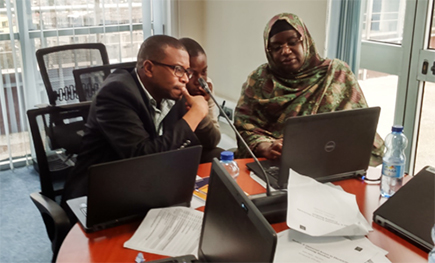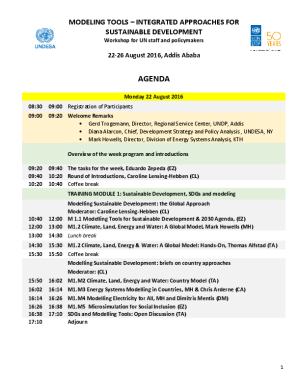DESA/DPAD in partnership with UNDP launched an initiative to develop a training course aimed at strengthening the science-policy interface to inform sustainable development strategies; raise capacity to establish the inter-linkages across the three dimensions of sustainable development; acquaint participants with the technical tools available; and the implications of an integrated approach for policy decision making. The course is being designed for a wide range of middle to high level government officials, development practitioners and UN staff.
With the purpose of pilot testing the training program, on the week of 22-26 August, DESA and UNDP organised the workshop ?Modelling tools-integrated approaches for sustainable development policies? at the UNDP Regional Service Centre for Africa in Addis Ababa. The workshop gathered 30 government officials and UN staff in the field joining from 15countries.
 In its current format, the training program covers some of the tools available in DESA?s web platform ?Modelling tools for sustainable development policies?. Namely: integrated assessments methodologies, energy systems modelling, energy and electricity for all using geographic information systems, and the analysis of social inclusion through microsimulations. The 5 days hands-on training program was conducted by modelling experts from the Royal Institute of Technology of Sweden (KTH), International Atomic Energy Agency (IAEA), and led by Eduardo Zepeda, recently retired from DESA. Presentations were also made by government officials from Uganda, Bolivia and Nicaragua who have participated in DESA?s capacity development projects in the past. They made important contributions demonstrating the use of modelling tools to inform national policies for sustainable development in the concrete policy context of their own countries.
In its current format, the training program covers some of the tools available in DESA?s web platform ?Modelling tools for sustainable development policies?. Namely: integrated assessments methodologies, energy systems modelling, energy and electricity for all using geographic information systems, and the analysis of social inclusion through microsimulations. The 5 days hands-on training program was conducted by modelling experts from the Royal Institute of Technology of Sweden (KTH), International Atomic Energy Agency (IAEA), and led by Eduardo Zepeda, recently retired from DESA. Presentations were also made by government officials from Uganda, Bolivia and Nicaragua who have participated in DESA?s capacity development projects in the past. They made important contributions demonstrating the use of modelling tools to inform national policies for sustainable development in the concrete policy context of their own countries.
At the end of the workshop participants expressed the importance of this initiative as a unique effort to support development practitioners to understand the interlinkages and trade-offs between goals, policies and dimensions of sustainable development, and to reflect on these issues under a different scope, with support of modelling tools to illustrate the underpinnings for the development of coherent and integrated policy frameworks.
This pilot workshop has provided valuable insights on areas that need improvement in the design of the final training program. The revised version of the training program will be ready in late October for replication at a larger scale as needed. All course materials, including the learning guide for users, will be available through DESA?s web-platform ?Modelling tools for sustainable development policies?.
 Welcome to the United Nations
Welcome to the United Nations
